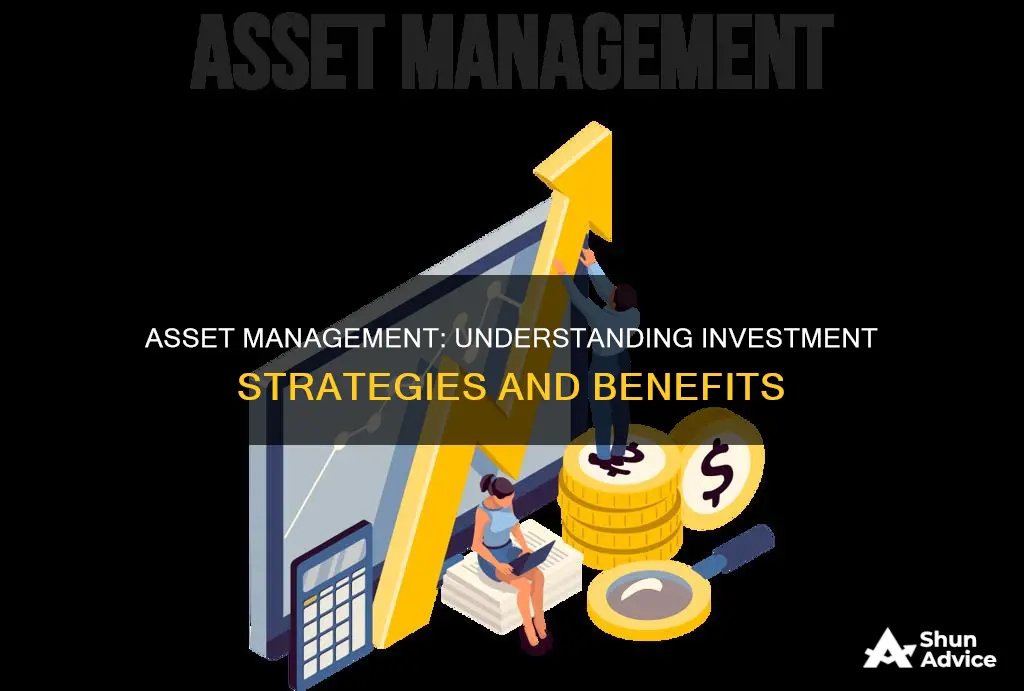
Investment asset management is a financial service that involves managing a client's money to increase their wealth over time. It entails buying, selling, and managing investments, such as stocks, bonds, real estate, and commodities, while considering the client's risk tolerance and financial goals. Asset management firms make well-timed investment decisions on behalf of their clients, aiming to grow their finances and portfolio value. These firms often work with a diverse group of investors, allowing them to diversify portfolios, access higher-value options, and mitigate risks. The primary role of asset management companies is to make strategic purchases that enhance the overall value of their clients' funds.
| Characteristics | Values |
|---|---|
| Definition | Management of investments such as stocks, bonds, and other financial instruments in various asset classes |
| Goal | To build and increase wealth over time |
| Who is it for? | Regular people, nonprofit organizations, public companies large and small, high-wealth individuals |
| Who provides the service? | Asset management companies, investment banks, investment advisors, financial advisors, wealth managers, institutional wealth managers, registered investment advisors (RIAs), robo-advisors, stockbrokers, brokers, financial institutions, banks |
| Fiduciary responsibility | Asset managers have a fiduciary responsibility to act in their clients' best interests |
| Investment types | Stocks, bonds, real estate, commodities, alternative investments, mutual funds, ETFs, hedge funds, private equity |
| Fee structure | Percentage of assets under management, fee for each trade executed, commission |
| Role of asset managers | Creating a client's portfolio, overseeing it, making changes, communicating with the client |
| Top asset management institutions | BlackRock, Vanguard Group, Fidelity Management and Research, The Capital Group, Amundi |
What You'll Learn

Investment advisors, financial advisors, wealth managers, institutional wealth managers, registered investment advisors (RIAs), robo-advisors and stockbrokers
Investment asset management is the practice of buying, selling, and managing investments to increase wealth over time while maintaining an acceptable level of risk. Here is a detailed description of the roles of investment advisors, financial advisors, wealth managers, institutional wealth managers, registered investment advisors (RIAs), robo-advisors, and stockbrokers:
Investment Advisors
Investment advisors are professionals who provide investment advice and financial planning services to their clients. They may offer a range of services, including investment management, retirement planning, budgeting, insurance, and tax advice. Investment advisors typically work with securities and are usually required to be registered with the state to ensure they meet regulatory standards that protect their clients.
Financial Advisors
Financial advisors offer a broad range of financial planning services, including investment management, retirement planning, budgeting, insurance, and tax advice. They may also specialize in specific areas such as tax or estate planning. Financial advisors can work with individuals or institutions and often buy and sell securities on behalf of their clients.
Wealth Managers
Wealth managers focus on issues surrounding their clients' wealth. They aim to grow and maintain their clients' wealth, providing services such as tax-advantaged strategies, estate planning, and charitable giving strategies. Wealth managers typically work with high-net-worth individuals and charge a fee as a percentage of the assets under their management.
Institutional Wealth Managers
Institutional wealth managers are wealth managers who work specifically with institutions, such as corporations or government entities, rather than individual clients. They provide similar services to wealth managers but cater to the unique needs and circumstances of their institutional clients.
Registered Investment Advisors (RIAs)
Registered Investment Advisors (RIAs) are financial professionals or firms that advise clients on securities investments and manage their investment portfolios. RIAs have a fiduciary duty to act in their clients' best interests and must register with the Securities and Exchange Commission (SEC) or state securities administrators, depending on the value of the assets they manage. They typically earn their income through management fees calculated as a percentage of their clients' assets under management.
Robo-Advisors
Robo-advisors are digital platforms that provide automated, algorithm-driven financial planning and investment services with minimal human supervision. They offer low-cost, easily accessible investment options, especially for those with limited investment experience or smaller accounts. Robo-advisors typically use passive indexing strategies and are well-suited for traditional investing. However, they may lack the sophistication and empathy needed for more complex issues like estate planning.
Stockbrokers
Stockbrokers are financial professionals who execute trades and provide investment advice to clients. They work for brokerage firms and handle transactions for individual and institutional customers. Stockbrokers often have a college degree in finance or business administration and must be licensed by the Financial Industry Regulatory Authority (FINRA). They are typically paid on commission, although compensation can vary depending on the employer.
Invest Wisely: A Guide to Savings in Australia
You may want to see also

Fiduciary responsibility
Fiduciary management is an approach to asset management where an asset owner appoints a third party to manage their total assets on an integrated basis. This is done through a combination of advisory and delegated investment services, with the goal of achieving the asset owner's overall investment objectives. Fiduciary management involves outsourcing the day-to-day management of a pension scheme to a fiduciary manager provider. This allows trustees to focus on strategic decision-making and long-term outcomes while fiduciary duties are transferred to the provider.
Fiduciaries are legally and ethically bound to act in the best interests of their clients. They are required to put their clients' interests ahead of their own and to preserve good faith and trust. Fiduciary duties include the duty of loyalty and the duty of care. Investment managers, for example, have a fiduciary duty to act in the best interests of their clients when managing their investment portfolios. They must disclose information, vote proxies for shares held by advisory clients, and comply with policies and procedures.
The Investment Advisers Act of 1940 regulates registered investment advisers and requires them to register with the Securities and Exchange Commission (SEC) or the states in which they do business, depending on the amount of money they manage for clients. Fiduciaries are held to the fiduciary standard, which requires them to always act in the best interest of their clients.
Fiduciary duties can arise in various relationships, including between a trustee and a beneficiary, corporate board members and shareholders, executors and legatees, and investment corporations and investors. Fiduciary responsibilities can significantly shape investment strategies, especially with the growing emphasis on ethical investing and considering long-term risks and opportunities.
Fiduciary abuse or fraud occurs when an individual or entity with fiduciary duties uses their power in an unethical or illegal manner to serve their self-interest. To mitigate this risk, fiduciary liability insurance can be obtained to provide financial protection in cases of purported mismanagement of funds or investments, administrative errors, or erroneous advice.
Building a Tax-Efficient Investment Portfolio: Strategies for Success
You may want to see also

Buying, selling and managing investments
Asset management is the practice of buying, selling, and managing investments to increase wealth over time. Asset managers, or financial professionals, are responsible for making these investment decisions on behalf of their clients. They are also known as investment advisors, financial advisors, wealth managers, institutional wealth managers, registered investment advisors (RIAs), robo-advisors, and stockbrokers.
The process of asset management involves "putting money to work" by buying, holding, and selling financial assets with the potential to achieve a client's investment goals. This includes purchasing stocks, bonds, commodities, shares in private funds, and more.
Asset managers have a fiduciary responsibility to their clients, meaning they are legally required to act in their client's best interests. They make decisions on behalf of their clients and are expected to do so in good faith.
When buying and selling assets, asset managers consider the financial objectives of their clients. For example, the stock market can deliver fast returns, while property is ideal for long-term asset management. They also assess the client's risk tolerance, which can vary depending on factors such as age and financial situation.
Asset managers work with a group of investors, allowing them to diversify their clients' portfolios and access higher-value options with better capital appreciation prospects while mitigating the associated risks. They conduct rigorous research, including statistical analysis of market trends and reviews of corporate financial documents, to make informed investment decisions.
The cost of asset management varies depending on the asset manager and the chosen investment strategy. Active investment strategies, for instance, tend to have higher costs than passive, index-based investing strategies. Typical annual fees for active investment management are around 1% of the total assets, while passive management fees range from 0.20% to 0.50%.
In summary, asset managers play a crucial role in helping clients achieve their financial goals by making well-timed investment decisions, diversifying portfolios, and managing risks.
Outsourcing Investment Management: Pros, Cons, and Practicalities
You may want to see also

Risk tolerance
An investor's risk tolerance plays a crucial role in determining their investment choices and portfolio construction. Those with a higher risk tolerance tend to invest in stocks, equity funds, and exchange-traded funds (ETFs), seeking potentially higher returns despite the risks. On the other hand, individuals with a lower risk tolerance often opt for lower-risk investments like bonds, bond funds, and income funds, prioritising capital preservation.
It is important to note that risk tolerance is subjective and can change over time due to factors such as age, life events, and economic conditions. As individuals experience life milestones, their risk tolerance may shift, and they may become more or less willing to take on investment risks. Therefore, it is essential for investors to periodically reassess their risk tolerance and adjust their investment strategies accordingly.
Additionally, it is worth distinguishing between risk tolerance and risk capacity. While risk tolerance refers to the psychological willingness to take on risk, risk capacity relates to the financial ability to endure potential losses. Both factors are crucial in crafting a balanced and effective investment strategy.
Can I Deduct Investment Management Service Fees?
You may want to see also

Investment options
The investment options available to asset managers are diverse and depend on the financial objectives of their clients. Some common investment options include:
- Stocks: These are shares of ownership in a company, and they can provide fast returns.
- Bonds: Bonds are a type of loan taken out by companies or governments, offering a steady income stream.
- Property: Property investment is ideal for long-term asset management, providing stable returns over time.
- Mutual Funds: These are professionally managed investment funds that pool money from multiple investors to purchase a diversified portfolio of assets, such as stocks, bonds, and other securities.
- Exchange-Traded Funds (ETFs): ETFs are similar to mutual funds but are traded on stock exchanges, offering more flexibility and potentially lower fees.
- Commodities: This includes investing in physical substances like gold, silver, or agricultural products, which can act as a hedge against inflation.
- Alternative Investments: Asset managers may also explore alternative investments such as private equity, hedge funds, or real assets like art or collectibles.
The choice of investment options depends on the client's risk tolerance, financial goals, and time horizon. Asset managers conduct thorough research and analysis to determine the most suitable investment strategies for their clients.
When selecting investment options, asset managers also consider the level of risk associated with each option. Some investments, like stocks, tend to be more volatile and carry higher risks, while others, such as bonds or real estate, are generally considered more stable and conservative.
Additionally, asset managers employ various strategies to mitigate risk, including diversification, where they spread their client's investments across a variety of assets to reduce the impact of any single investment on the overall portfolio. This diversification can occur across different industries, geographic regions, or asset classes.
It's important to note that risk tolerance varies from client to client, and asset managers work closely with their clients to understand their comfort level with risk and make investment decisions accordingly.
How to Grow Your Investment Portfolio Wisely
You may want to see also
Frequently asked questions
Investment asset management is the professional service of managing a client's money to increase their wealth over time. This involves buying, selling, and managing investments on behalf of the client while maintaining an acceptable level of risk.
Asset managers are financial professionals who manage money and investments for their clients, with the goal of growing the value of their assets. They may be known as investment advisors, financial advisors, wealth managers, or stockbrokers.
There are several types of asset managers, including Registered Investment Advisors (RIAs), investment brokers, and financial advisors. RIAs are legally required to act in their client's best interests and are compensated through annual fees. Investment brokers buy and sell investments for their clients and earn sales commissions. Financial advisors establish financial goals with their clients and build investment portfolios to achieve those goals; they may be compensated through fees or commissions.
Asset management firms manage funds for individuals and companies, making well-timed investment decisions to grow their client's finances and portfolios. They diversify their client's portfolios by pooling funds from multiple investors, allowing access to higher-value options with better capital appreciation prospects while mitigating risk.
Asset management firms look for individuals with strong analytical skills, confident decision-making abilities, effective communication skills, time management capabilities, and the initiative to seek out new opportunities.







